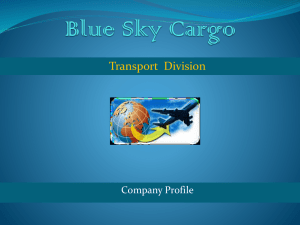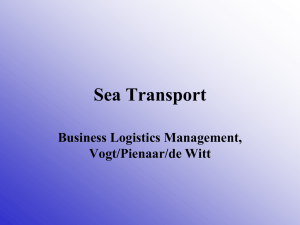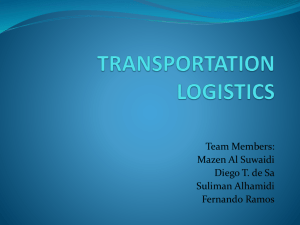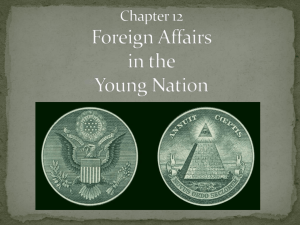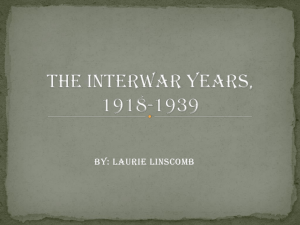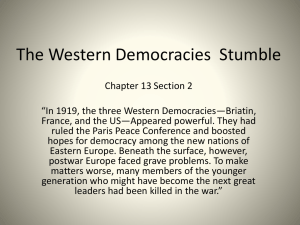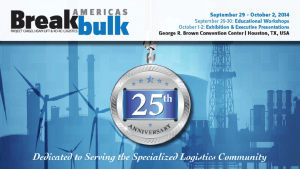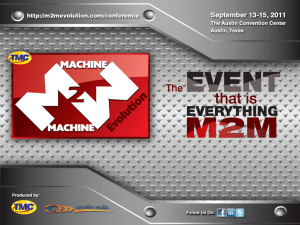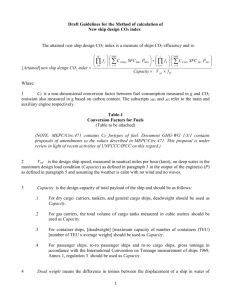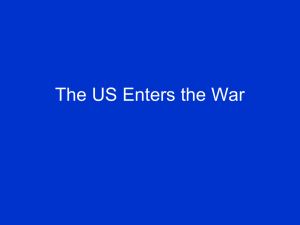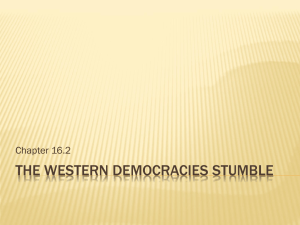by Andrew Neil
advertisement
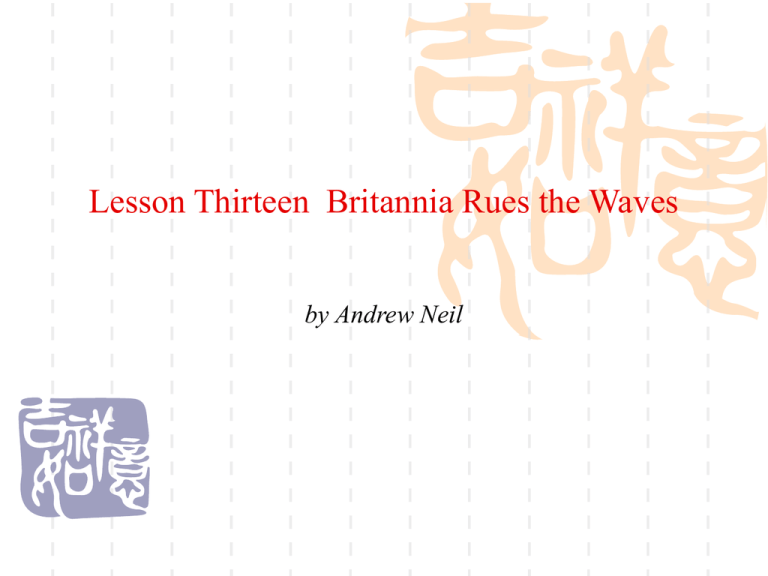
Lesson Thirteen Britannia Rues the Waves by Andrew Neil Ⅰ. Background Information 1). Britannia Rues the Waves: This is a parody of Britain's proud boast, "Britannia Rules the Waves". "Rule, Britannia" is a famous naval song much sung and played in the British Navy from the date of its first performance in 1740 to the present day, and generally recognized today as the official march of the Royal Navy. It was written by James Thomson and set to music by Dr. Thomas Arne (1740). The song runs like this: When Britain first, at Heaven's command, Arose from out the azure main, This was the charter of her land, And guardian angels sang the strain: Rule, Britannia! Britannia, rules the waves! Britons never shall be slaves. The author means that today, instead of ruling the waves, Britain is sorry that it has lost its dominance on the high seas. 2). Andrew Neil: writing on industrial and labour affairs for the ‘Economist' 3). North Sea Oil: oil produced from the British sector of the Continental Shelf under the North Sea. Oil was first discovered under the bed of the North Sea in 1970 and production began in 1975. 4). tax concessions: a right or privilege granted by the government to be tax exempt 5). depression: a protracted period in which business activity is far below normal and the pessimism of business and consumers is great. It is characterized by a sharp curtailment of production, little capital investment ,a contraction of credit, mass unemployment and low employment, and a very high rate of business failures. 6). doldrums: the belt of calm which lies inside the trade winds of the northern and southern hemisphere. This area, which lies close to the equator except in the western Pacific where it is south of the equator, had great significance during those years when the trade of the world was carried by sailling ships. The term is also used to signify a state of depression or stagnation, an analogy of the general depression of the crews of ships lying motionless while in the areas of the doldrums, unable to find wind to fill their sails. 7). dry cargo: commodities that are not liquids 8). liner: a ship belonging to a shipping company which carries passengers on scheduled routes. A cargo liner is a cargo-carrying vessel with accommodation for a few passengers. 9). P & O: Peninsular and Oriental Steam Navigation Company, founded in 1840, world-wide passenger service 10). container ship: a cargo vessel specially designed and built for the carriage of cargo prepacked in containers. With a standardized size of container, holding 18 tons of cargo, holds and deck spaces can be designed exactly to accommodate containers, leading to greater ease and efficiency in stowage and the eradication of much of the danger of the cargo shifting during heavy weather at sea. 11). UNCTAD: United Nations Conference on Trade and Development, set up as an organ of the UN General Assembly by a resolution of December 1964. UNCTAD is concerned with the fundamental problems affecting the trade of developing countries. It has its headquarters in Geneva. 12). Iron Curtain: referring to the Soviet Union and the eastern European countries in the capitalist press, first used by Churchill in his speech at Fulton, Missouri, 5 March 1946:"From Stettin in the Baltic to Trieste in the Adriatic an iron curtain has descended across the Continent. “ 13). EEC: European Economic Community, established by treaty signed at Rome March 25, 1957, effective January 1, 1958. EEC headquarters are in Brussels and it comprises a Council of Ministers, an executive Commission, and the Assembly and Court of Justice. Ⅱ. Questions after the detailed study of the text 1. According to the author Britain is handicapped in her attempts to counter the challenges of the developing world and the Soviet Union at an international level. What are these handicaps or problems? Does this tell us anything about the capitalist world? 2. How are the British shipping companies trying to meet the challenge? Are they confident that they can counter the challenge successfully? 3. Comment on the title of the article. What is the implied meaning? Ⅲ. Analysis and Appreciation of the text 1. The outline of the text 2. Type of literature – exposition Ⅳ. Special difficulties in the text 1. understanding some proper names 2. paraphrasing some sentences 3. identifying figures of speech Ⅴ. Rhetorical Devices 1. 2. 3. 4. antithesis oxymoron simile ridicule VI . Detailed study of the text 1. institution: organization, system 2.cutthroat: very fierce, merciless, intense, implying sth. unprincipled 3. price-cutting: lowering the price 4. settled: stable, fixed, inflexible; not changeable 5. cargo: the goods carried by a ship, plane or vehicle; freight 6. cartel: a combination of independent companies in order to limit competition and increase profits for its members 7. dignified: noble, high-sounding, elegant, grand 8. governing: controlling 9. dodgy: risky, possibly dangerous 10. make a big killing: make a lot of money soon 11. times: the prevailing conditions of a period good times: favorable times when market is lively and business is booming bad times: difficult times, depression, declining period 13. weather: pass safely through 14. scramble: a rough, eager and disorderly struggle 16. boom: a rapid growth, increase 17. quadruple: multiply by four; increase by four times 18. slide: a downward turn, falling 19. cut back: reduce in amount 20. charter: practice of hiring or renting cars, planes, etc., for special use 21. rate: charge, price 22. plummet: drop dramatically 15. around the corner: very near, imminent 22. estuary: the wide lower part or mouth of a river into which sea enters at high tide 23. jammed: crowded; congested 24. mothball: balls stored together with clothes to repel moths; the state of being stored or kept in existence, but not used; the state of having been put aside, as of no further use; (metaphor) 25. British ship owners had been wise enough not to have invested big in tanker trade when oil tankers were in great demand, so they didn’t suffer great losses in this field. 26. slump: a time of seriously bad business condition and unemployment; depression 27. ore: rock or earth etc. from which metal can be obtained 28. by far: by a large degree 29. in the doldrums: in a serious depression, in a state of inactivity 30. feel the pinch: feel the pressure, feel the impact of the slump pinch: a painful, difficult situation; suffering caused by the lack of necessary things 31. sector: part of a field of activity, esp. of business and trade 32. still a long way from bankruptcy: still far from danger 33. freight: goods carried by some means of transport freight-liner: ships for moving goods regularly between two places along a fixed route; liner-freight vessel 34. strongly-entrenched: firmly and securely established 35. entrench: place or lodge oneself in a safe position 36. call at ports: visit ports after the start of a journey and before the end 37. going freight rate: commonly accepted price at present for using a freight liner 38. parcel service: a service that is convenient like sending a parcel, catering to customers who need to use only part of the space in a ship 39. plus: favorable addition, advantage; plus factor 40. buoyancy: literally, the power of liquid to force upward an object pushed down into it; here, the property of maintaining a satisfactorily high level, as of price, business, or activity; promising state; hopefulness 41.That characteristic put them in a better or advantageous position than that for oil tankers or bulk carriers; making it easier for freight-liners to weather the bad times. 42.see: visit, call at 43.cross-traders are used to carry goods between foreign countries 44.big: doing much business, very influential or powerful 45. run: line, route 46.be out to do: be bent on doing; try to do; make a determined effort to do 48. something of: rather a; a fairly good 47. emerging countries: newly independent countries; countries rising from a poor dependent state to a rich independent state 49. status symbol: a sign which shows or matches one’s high social status; here a symbol to show that these countries have become politically independent and economically strong 50. go for: try to get 51. foresee: form an idea or judgment about what is going to happen; (unforeseen) 52.planning for…the third world: Great Britain is getting prepared for the coming situation, where the new powers will have a bigger share of the trade while Great Britain is cutting down its own percentage in the world trade 53. throw in the towel / sponge: admit defeat or failure; surrender; give in 54. tactics: art of arranging military troops for battle and moving them during the battle; the art of using the existing means to get a desired result 55. strategy: art of planning movements of armies or forces in war; more inclusive or comprehensive than tactics 56. hold on to: hang on to; try to keep; not let go; not give up 57. the richest slice: the lion’s share 58. move up-market: to invest in high-tech branches, for instance, container ships, so that the third world countries can not afford to follow and thus not in a position to compete with it 59. put up the money: put in the investment pioneer: start, initiate, take the lead in 60. dockside: a place where ships are loaded, unloaded, or repaired 61. A container can only be recognized or identified by a number outside, so the thief cannot get to know what the content is, hence safe from theft. 62. P & O’s…strategy is by no means the complete reaction to the threat posed by the third world countries. There is much more to it than that. There is more involved in the response. 63. not by purely commercial means, but by institutional means, by setting up certain regulations favorable to the developing countries 64. impose: force the acceptance of, establish 65. guarantee: give a promise of fulfillment about; assure 66. find official expression in: be formally expressed or represented in 67. lay down: stipulate; formulate 68. respective: for, belonging to each of those in question 69. revenue: income, esp. that which the government receives as tax 70. ratify: approve of or make official by signing 71. bring into force: put into effect, make begin to operate 72. Iron Curtain countries: Russia and other Eastern bloc countries 73. counter: meet, deal with; overcome 76. make major inroads into: penetrate or bite deeply into; carve its way into; take over a large portion of the trade 74. justify: warrant, give a good reason for, require, make necessary or probable 75. come into service: begin to serve the public; come into use, get ready for use 77. seaborne: carried or brought in ships 78. Russia is deeply involved in the major routes of the world’s cross-trade 79. afford to do: be in a position to do 80. in our sense of the word: in the way we understand the word “profit” 81. the name of the game: the thing that really counts, the real purpose of their action, the most important objective 82. hard currency: a currency which other countries want to obtain 83. even sterling: implying and mocking that the position of sterling or pound is not as strong as other money, like dollars, etc. 84. at a loss: in deficit, doing business at a price lower than the original cost make up: supply sth. not done, lost, or missing; compensate 85. more to it: that is not the only purpose of Russia; there is more involved in the business here 86. mercantile: of merchant or trade 87. mercantile marine: merchant navy / fleet 88. reach: range of influence or power 89. well: to a considerable degree 90. perimeter: the outer boundary of an area; fringe; borderline of the country 91. project: get across or extend its influence to others 92. .hydrographic: concerning the study of oceans with reference to their navigational or commercial uses 93. deepen contacts: strengthen ties, increase communication 94. If the western companies also compete with others by undercutting by 40%, they are sure to go bankrupt or sure to be elbowed out of market, that is their share of market is sure to be taken over by others. VII . Assignment Write a composition with a title of -- The Shipping Industry in China
